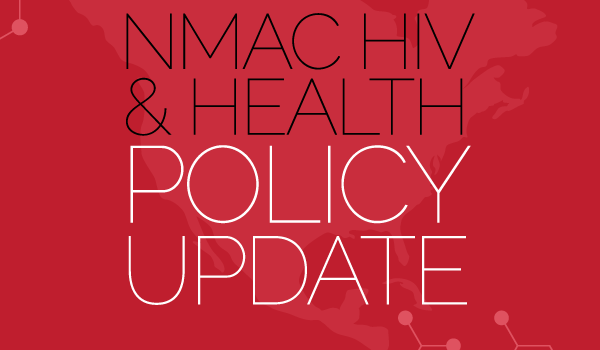Week ending: May 3, 2019
By: Sable K. Nelson
FY20 House Labor-HHS Appropriations Summary (Upcoming Fiscal Year)
On April 29, 2019, the House Appropriations Committee released the draft fiscal year 2020 (FY20) Labor, Health and Human Services, Education, and Related Agencies (LHHS) funding bill, which included the following funds for federal HIV programs:
- $3.2 billion for HIV/AIDS research.
- $140 million to support CDC’s efforts to reduce new HIV infections by 90 percent in 10 years.
- $2.4 billion, an increase of $116 million, for the Ryan White HIV/AIDS program.
- $50 million in Health Centers and $70 million in the Ryan White HIV/AIDS program to reduce new HIV infections by 90 percent in 10 years.
- $60 million for the Minority HIV/AIDS Initiative, an increase of $6 million above the fiscal year 2019 enacted level.
This is part of the third step in the annual federal appropriations process:
FY19 Funding Update (Current Fiscal Year):
The Minority HIV/AIDS Fund in the HHS Office of the Assistant Secretary for Health (OASH) is allocating approximately $29 million from the Minority HIV/AIDS Fund to begin the community planning process for the federal initiative designed to reduce the number of new HIV infections in the United States by 75 percent over five years and 90 percent by 2030. For more information, READ.
Trump Administration Releases Final Conscience Rule
The final rule “Protecting Statutory Conscience Rights in Health Care; Delegations of Authority” (RIN 0945‐AA10) was published in the Federal Register on 05/02/19 (to coincide with the National Day of Prayer) and will become effective 60 days after publication. It grants federal nondiscrimination protection to health care providers who deny services to people who violate the providers’ sincerely held religious beliefs. Language in the final rule focuses on abortion, assisted suicide, and sterilization. But it is modelled on new religious refusal laws in 12 states that have been used to deny services, including health care, to LGBT people. For more information, READ.
While there will not be an additional opportunity for us to comment on the final rule (comments were due on or before March 27, 2018), individuals/organizations could discuss the final rule in any comments they submit regarding HHS OCR’s proposed new complaint forms. This would provide the community with an additional opportunity to publicly speak about this broad and unjustifiable expansion of religious refusals. Here is the information collection request for the proposed forms — Health Information Privacy and Civil Rights/Consistence and Religious Freedom Discrimination Complaint. The comments for this information request are due May 17.
Podcast: KHN’s ‘What The Health?’ Bye-Bye, ACA, And Hello ‘Medicare-For-All?’
Margot Sanger-Katz of The New York Times, Paige Winfield Cunningham of The Washington Post and Erin Mershon of Stat News join KHN’s Julie Rovner to discuss the latest in news about the Trump administration’s effort to overturn the Affordable Care Act, a historic hearing on “Medicare-for-all” and the Kansas Supreme Court’s ruling that the state constitution protects a woman’s right to abortion. Also, Rovner interviews KHN’s Carmen Heredia Rodriguez about the latest “Bill of the Month” feature. For more information, LISTEN.
Virtual Listening Sessions: Opportunities to Inform Development of an STD Federal Action Plan – May 9, 2019
The U.S. Department of Health & Human Services Office of HIV/AIDS and Infectious Disease Policy (OHAIDP) will host a virtual listening session to gather public input to inform the development of a Sexually Transmitted Diseases (STD) Federal Action Plan.
Register for Listening Sessions
Your thoughts and recommendations are important, so HHS is offering listening sessions to provide the opportunity for people from across the United States to participate. Please consider joining one of these listening sessions. To do so, please register through the links below:
• Thursday, May 9, 2019: Virtual Listening Virtual Listening Session from 3:00—5:00 pm (ET). Register here.
Also Share Your Comments in Writing
In addition, HHS will soon publish a Request for Information (RFI) in the Federal Register to solicit written comments and recommendations for the STD Federal Action Plan that is being developed. As soon as the RFI is published, HHS will post a link to it as well as information about the deadline for input.
What You Can Do
TAKE ACTION: It is very important that our elected officials hear from us to protect federal funding for HIV prevention and care. Speak truth to power by sharing your personal stories with your elected officials. It is vitally important to meet with your federal elected officials when they are at home. If we don’t support and advocate for HIV funding and programs, who will? Our movement cannot afford to stand on the sidelines. Your U.S. Senators and U.S. Representatives need to hear from you.
- Find your U.S. Senators: https://www.senate.gov/general/contact_information/senators_cfm.cfm
- Find your U.S. Representative: https://www.house.gov/representatives/find-your-representative
What NMAC is Doing About It
- NMAC remains vigilant in its advocacy to protect FY20 government funding and the existence of the social safety net.
- NMAC is working in coalition to defend the right of people living with HIV to serve in the US military.

